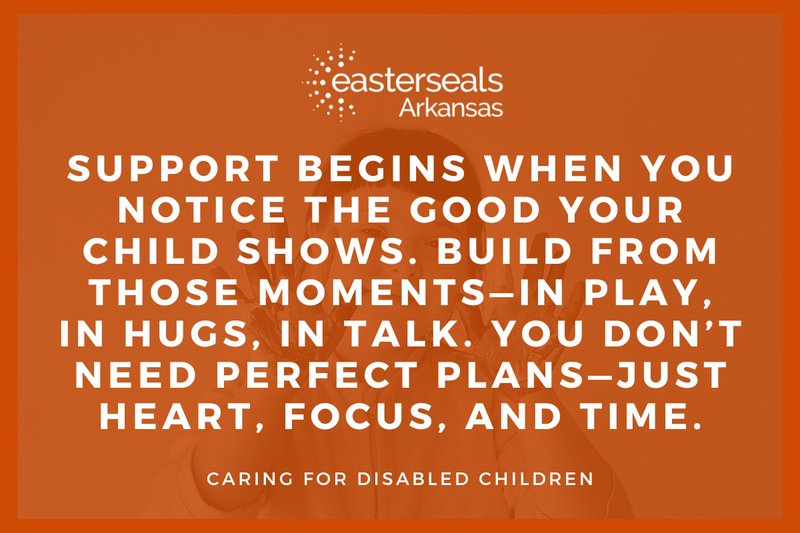
Caring for disabled children requires comprehensive support that truly recognizes their unique abilities. Beyond therapy schedules and care plans, families need practical tools that work at home, clear answers from professionals, and empathetic listeners. This guide is designed to walk you through the journey, providing the essential resources and support needed right now.
Key Takeaways:
- Children with disabilities may have strengths in art, music, motion, or routine; nurture these for growth.
- Use body language, eye contact, and tools like picture boards to communicate if verbal speech is limited.
- Daily brain development is supported through play, talk, music, and sensory activities during routine care.
- Create consistent, supportive routines with visuals; structure helps children feel safe and ready to learn.
- An individualized care plan should match strengths with needs and include small, measurable goals.
- Use adaptive tools for feeding, hygiene, and sleep; many states offer caregiver pay and Medicaid waivers.
- Early intervention (IFSP) is key; start with pediatricians and use milestone checklists from the CDC.
- IEPs provide school support; collaborate with teachers and advocate using documentation and clear goals.
- Speech, occupational, and physical therapies support growth; choose professionals with skill, kindness, and focused goals.
- Community help can be found through Easterseals, The Arc, and local groups; events ease loneliness and build support systems.
- Self-care and support groups help prevent caregiver burnout; rest, counseling, and connection matter.
- Financial help via SSI and state waivers is available; some states pay parents to provide at-home care.

Understanding Your Child's Unique Abilities: Caring for Disabled Children
Recognizing Strengths in Your Child with Disabilities
Children with disabilities possess unique strengths in areas such as art, music, movement, and determination. Every child is gifted in some way—be it a gentle demeanor, a love for patterns, or keen observation skills. Parents should observe what captivates their child, such as sounds, colors, or routines that bring comfort.
Identifying these interests can guide activities that not only nurture these strengths but also support brain development. Musical play for those who hum or active games for the movement-inclined are more than engaging; they're brain-boosting. Acknowledging these talents fosters pride and joy.
According to Professor Maureen Samms-Vaughan, focusing on talents enhances learning, bonding, and daily achievements.
Enhancing Communication When Speech is Limited
Children can communicate beyond words through facial expressions, gestures, and movement. Careful observation of these cues—like smiles when touched or gestures signaling needs—provides insights into their feelings.
Tools such as eye contact, hand signs, or picture cards aid interaction. Utilizing photo boards for those who point or sounds for visually impaired children can be effective. Allow time and space for expression, and respond to show attentiveness.
Daily Activities That Promote Brain Development
Everyday interactions can significantly support brain development. Naming clothing items when dressing or incorporating songs while cooking can help form neural pathways. Simple actions and sounds during meal prep or bath time educate while caring for physical needs. A gentle voice and eye contact promote trust and connection.
For further inspiration, explore the benefits of preschool in child development. Daily play and interaction can make a lifelong difference.
Effective Daily Parenting Strategies for Caring for Disabled Children
Creating a Comforting Daily Routine
Establishing a stable routine ensures predictability and control. Daily plans should include meals, play, learning, rest, and care. Consistent routines, enhanced with visual aids, nurture a calming environment.
Sample Routine:
- Wake and brush teeth
- Eat breakfast
- Gentle movement
- Sound or light play
- Quiet time before lunch
- Eat lunch together
- Sensory activities
- Rest
- Outdoor time
- Dinner and hygiene
- Story or music before sleep
Creating Individualized Care Plans at Home
Craft care plans by matching specific needs to appropriate actions. Begin by identifying your child's preferences and challenges, focusing on soothing elements. Collaborate with healthcare or educational professionals to set small, achievable goals.
Break down larger goals into manageable steps, using a checklist if necessary. Regular adjustments ensure the plan evolves with your child's growth.
The Individuals with Disabilities Education Act (IDEA) emphasizes tailored plans to meet individual needs.
Tools and Methods for Feeding, Hygiene, and Sleep
Feeding:
Adaptations like grip aids or curved utensils aid in feeding. Specialized chairs offer support. For tube-feeding, consult experts and explore support groups for shared insights.
Hygiene:
Incorporate songs or timers during brushing. Tools like sponge mitts enhance control. Consistent bathing routines build comfort and trust.
Sleep:
Maintain a dark room with soft sounds. Avoid screens before bedtime. Weighted blankets can ease anxiety. Consult a doctor for persistent sleep issues.
Each child is unique, and consistent care in love, and routine establish a supportive environment.
For further guidance, explore resources on the Individuals with Disabilities Education Act and related educational rights.
Routines rooted in a child’s strengths foster learning, calmness, and happiness.
Where to Get Early Help for Developmental Delays in Caring for Disabled Children
Recognizing Early Signs of Developmental Delays
If a baby stops smiling, shows disinterest in sounds, or if a toddler avoids eye contact and struggles with play, these might be signs that a developmental check is needed. Trusting parental instincts is crucial in these situations.
Assess whether the child meets expected milestones. Utilize resources like the CDC’s milestone checklists available at Learn the Signs. Act Early to evaluate age-appropriate skills. Seeking support is essential if the child’s development doesn’t align with these milestones.
Steps to Initiate Support Services in Caring for Disabled Children
Consulting Healthcare Professionals
Start by discussing concerns with a pediatrician. They may conduct observations, perform screenings, or refer the child for comprehensive developmental evaluations. These assessments focus on speech, play, and movement skills.
If delays are identified, initiate early intervention services spanning birth to age three. These interventions target challenging areas through a customized Individualized Family Service Plan (IFSP).
Understanding the Value of an IFSP
An IFSP provides a tailored approach, setting goals and services based on the child’s current needs. It includes speech, play skills, behavior, movement, and daily living skills. Services can occur at home, in daycare, or with relatives, making support accessible in familiar environments.
The IFSP also incorporates family goals, enabling children to express needs or engage in play with siblings. Skilled professionals, including speech and play therapists, assist in integrating therapy into daily life.
Collaborating with Specialists
A multidisciplinary team supports the child’s journey:
- Developmental Therapist: Encourages learning through play
- Speech Therapist: Assists with communication and feeding
- Occupational Therapist: Focuses on fine motor skills like dressing
- Physical Therapist: Builds strength, balance, and mobility
- Special Educator: Helps with focus and task completion
Collaboration ensures comprehensive support that evolves as the child grows. Starting early enhances cognitive and emotional development during critical early years.
Further Support Through Easterseals Arkansas
For additional guidance and resources, explore Easterseals Arkansas’ programs that emphasize early intervention and community support. Initiating these services early lays a foundation for success, empowering children to thrive.
Advocating for Special Education in Schools While Caring for Disabled Children
Understanding and Utilizing an IEP
An Individualized Education Plan (IEP) provides tailored support within the school setting, outlining the child’s learning needs and entitlements. If a child struggles, the school must conduct evaluations with parental consent to develop the plan, thereby ensuring the right support is in place. Preparing for IEP Meetings
Gathering Essential Information
Collect documentation like schoolwork, therapist notes, and medical reports. Share strategies that help the child excel at home and advocate for necessary classroom support.
Engaging in the IEP Process
During meetings, speak clearly about what works and inquire about strategies to achieve each goal. Collaboration with teachers is key, offering insights from home practices that can enhance classroom learning. Regular communication with educators ensures consistent support.
Refer to this back-to-school guide for additional preparation strategies.
Financial Supports for Families of Disabled Children
Accessing SSI and Medicaid Waivers
Families may qualify for Supplemental Security Income (SSI) if income limits are met and the child has a qualifying disability. This program provides monthly financial assistance for essential needs, offering critical support for family life. Verify eligibility on the Social Security Administration’s website.
Medicaid waivers enable at-home care rather than institutionalization. States have unique rules, with some providing services like nursing, therapies, or home modifications. Early application is crucial due to potential waitlists.
Navigating Federal Support Programs
Eligibility requires medical verification and adherence to income regulations. Applications for SSI necessitate comprehensive medical and educational documentation, regularly updated to maintain benefits.
Waivers are managed at the state level. Contact the local Medicaid office to identify the specific needs your child requires assistance with, such as movement, eating, or communication.
Explore local resources for further guidance on accessing support.
Compensation for Family Caregivers
Some states, including California and Colorado, offer programs to compensate parents caring for their disabled children at home. Programs like California’s In-Home Supportive Services (IHSS) or Colorado’s Certified Nursing Assistant (CNA) training provide income and valuable training, enhancing caregiving skills. Contact local disability offices for information on relevant programs.
These initiatives alleviate financial strain and provide essential resources and community connections.
Protecting Emotional Well-Being While Caring for Disabled Children
Recognizing Signs of Caregiver Burnout
Caring for a disabled child is rewarding yet demanding, and caregivers often overlook their own needs. Key signs of burnout include persistent fatigue, irritability, sadness, sleep difficulties, and frequent illness. These symptoms indicate that the body is overwhelmed, and stress has taken a toll on the immune system.
Preventing Caregiver Burnout
- Rest and Relaxation: Even brief moments of rest are essential. Simple activities like reading a short story or enjoying nature can provide vital breaks.
- Regular Breaks: Incorporate short periods of relaxation throughout the day to maintain energy and focus.
Support Groups and Counseling for Caregivers
Support groups provide a nurturing environment where caregivers can share experiences and advice. The collective wisdom and empathy of group members offer relief from isolation and stress.
Benefits of Counseling
Professional counseling offers structured support, helping organize thoughts and alleviate stress. Mental health professionals provide tools to manage emotions and cope with challenges.
Explore additional resources through:
- Military OneSource for Special Needs: Provides free support options.
- Easterseals Arkansas Educators and Caregivers Program: Offers specialized resources and support for educators and caregivers working with individuals with disabilities.
Importance of Self-Care in Long-Term Caring for Disabled Children
Caring for oneself is crucial for sustaining the ability to care for others. Emotional and physical health needs must be prioritized to avoid cracks in caregiving.
Practical Self-Care Strategies
- Routine Enjoyment: Simple pleasures like savoring a meal or engaging in meaningful conversations can rejuvenate.
- Guilt-Free Support: Asking for help from family, friends, or teachers lightens the load and enhances caregiving quality.
Adaptive Tools and Therapies for Caring for Disabled Children
Common Therapies and Their Benefits
- Speech Therapy: Enhances communication skills and addresses swallowing difficulties.
- Physical Therapy: Improves posture, strength, and balance, fostering independence.
- Occupational Therapy: Develops fine motor skills for daily tasks like dressing and feeding.
Explore the benefits of therapeutic services at Easterseals Arkansas.
Adaptive and Assistive Technology
Assistive tools empower children by facilitating communication, movement, and play. Options like speech tablets give voice to non-verbal children, while movement aids support safe and independent mobility.
Enhancing Daily Life with Technology
- Speech Tablets: Allows children to express needs and desires, enhancing connection and understanding.
- Movement Aids: Tools like walkers or gait trainers support mobility and build confidence.
Refer to local resources for more information on assistive technologies.
Selecting Qualified Therapists for Children with Disabilities
Choose therapists who demonstrate skill, kindness, and a commitment to clear, achievable goals. Trusting intuition and asking detailed questions are key steps in selecting the appropriate professional support.
Finding the Right Fit
- Warmth and Experience: Look for kindness and experience with similar cases.
- Clear Goals: Therapists should provide a clear plan with realistic, measurable objectives.
Resources like Easterseals Arkansas can guide families in connecting with the right therapists.
Connecting Families with Community Support and Advocacy Resources
Finding Local and National Support Networks
Organizations such as Easterseals, United Cerebral Palsy, The Arc, and Family Voices offer extensive support, training, and resources for caregivers.
- Check local offices or early learning centers for additional community support options.
Building a Support Network for Families
Starting with trusted individuals such as family, friends, and educators establishes a robust support network. Sharing stories and needs encourages communal bonds and fosters understanding.
Expanding Community Connections
- Online Forums: Select specific groups that align with your child’s needs to gain focused support and ideas.
- Community Events: Participate in sensory-friendly activities and resource fairs to build relationships and increase confidence.
Impact of Events on Family Connection
Community events offer welcoming spaces for caregivers and children, reducing isolation and fostering connections.
Benefits of Participation
- Events enhance skills and confidence while providing a sense of belonging.
- Groups such as The Arc and Family Voices advocate for parents and provide platforms for sharing at schools or local councils.
For further information and opportunities, visit Easterseals Arkansas.
Collective support manifests strength and resilience, providing a beacon of hope and connection. With the guidance of empathetic resources and community networks, caregivers are never alone in their journey.
Finding Support on Your Journey in Caring for Disabled Children
You know your child best, and that wisdom is invaluable as you care for them. We've explored various ways to support that knowledge—crafting individualized care plans, exploring therapies that aid development, securing financial help, and ensuring emotional support for yourself and your family. While these strategies may not solve every challenge, they provide a pathway to progress, empowering you to move forward one day at a time. Remember, you're not alone on this journey. Reach out for support, and connect with us at Easterseals Arkansas to discover tailored resources and compassionate guidance. Keep going, knowing that a community stands ready to support you and your family's growth and well-being.
